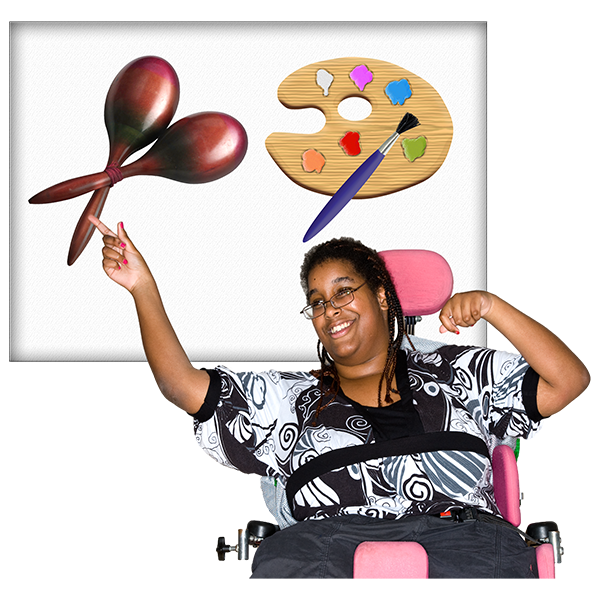Ahead of next week’s
Budget
 A budget is a plan where you look at how much money you have and how you will spend it.
, leading disability organisations have joined forces in an 11th hour call for
the Government
A budget is a plan where you look at how much money you have and how you will spend it.
, leading disability organisations have joined forces in an 11th hour call for
the Government
 The Government are the people who run the country. The Government decide how much tax people should pay and how things like the National Health Service (NHS) should work.
to reconsider planned
cuts
The Government are the people who run the country. The Government decide how much tax people should pay and how things like the National Health Service (NHS) should work.
to reconsider planned
cuts
 Cuts are when there is less money to pay for things like clubs and support.
to the Work Related Activity Group (WRAG) of the disability benefit
Employment
Cuts are when there is less money to pay for things like clubs and support.
to the Work Related Activity Group (WRAG) of the disability benefit
Employment
 Employment means having a job.
Support Allowance (ESA), which will see new claimants lose out on £30-a-week, £1500 a year
Employment means having a job.
Support Allowance (ESA), which will see new claimants lose out on £30-a-week, £1500 a year
The Government claims this cut will ‘incentivise’ disabled people to get in to work, despite a recent Work and Pensions Select Committee report highlighting that evidence towards this is ‘ambiguous at best’. Charities argue that instead of halving the disability employment gap, the cuts will directly undermine this aim pushing disabled people closer to or into poverty, with a
survey
 A survey is when someone asks you to answer some questions.
of over 500 disabled people finding:
A survey is when someone asks you to answer some questions.
of over 500 disabled people finding:
- Almost 7 in 10 (69%) say cuts to ESA will cause their health to suffer
- More than a quarter (28%) say they sometimes can’t afford to eat on the current amount they receive from ESA
- Almost half (45%) of respondents say that the cut would probably mean they would return to work later
- Just 1% said the cut would motivate them to get a job sooner
Rossanna Trudgian, Head of Campaigns at
learning disability
 A learning disability is to do with the way someone's brain works. It makes it harder for someone to learn, understand or do things.
charity Mencap said:
A learning disability is to do with the way someone's brain works. It makes it harder for someone to learn, understand or do things.
charity Mencap said:
The Government’s refusal to rethink the cuts to the benefits of disabled people has caused deep unease amongst disabled people as well as MPs from all parties. Introducing a cut of £30 a week to disabled people, many of whom are already living in poverty, without providing any robust evidence that this will incentivise people in to work. It will simply make life harder for sick and disabled people and directly contradicts the Government’s commitment to halve the disability employment gap.
Living with a disability often means a higher cost of living and being unemployed, leaving many relying heavily on the already restricted amount of money the Government provides. Disabled people are already struggling and risk being pushed further from work, their health suffering and being isolated from their communities. travel. We need the Government to recognise how damaging these cuts will be and stop them before their damaging effects are felt.
Open letter
Dear Prime Minister
The Prime Minister is the leader of the government. ,
We urge the Government to reconsider the £30-a-week cut to Employment and Support Allowance
Employment and Support Allowance is sometimes called ESA. It is a benefit for people who find it harder to get a job because of a disability or a long term health condition. (ESA) and Universal Credit facing sick and disabled people. The cut has caused deep concern among the sector and unease among MPs from all parties and we remain united as a sector in our opposition.
The cut to new claimants in the Work-Related Activity Group of ESA and within Universal Credit (UC) from 1st April 2017 will affect many people found currently ‘unfit for work’ but will also impact many disabled people in work and on low wages due to the way UC works.
Almost 70% of sick and disabled people surveyed said this cut would cause their health to suffer and just under half said they would probably not be able to return to work as quickly, therefore undermining the Government’s attempts to halve the disability employment gap - something we wholeheartedly support.
At a time when 1 in 3 households with a disabled member are living in poverty, £30 a week can be a huge loss in income. We therefore urge the Government to halt this cut immediately.
Signed:
Action on Hearing Loss
AdviceUK
Arthritis Research UK
Baroness Campbell Chair Independent Living Strategy
A strategy is a plan to show what an organisation, or a person, wants to do and how they are going to do it. Group
British Lung Foundation
Carers UK
Deafblind UK
Disability Agenda
An agenda is a list of things to talk about at a meeting. Scotland
Disability Rights
Rights are the things everyone should be allowed to do like have a say, or go to school. UK
Epilepsy Action
Guide Dogs
Inclusion London
Leonard Cheshire Disability
Mind
Motor Neurone Disease Association
MS Society
National Autistic Society
Rethink
Reclaiming Our Futures Alliance of grassroots Deaf and Disabled people’s organisations
RNIB
Royal Mencap Society
SAMH
Scope
Sense
Sir Bert Massie CBE, DL
Spartacus Network
United Response
-ENDS-
For further information, please contact the Mencap press office on 020 7696 5414 or media@mencap.org.uk or for out of hours 07770 656 659.
DBC Survey of disabled people
The Disability Benefits Consortium surveyed over 500 people aged 18 plus between August 3rd and 15th October across the UK. The surveys were conducted across the country and all relevant responses can be found below:
Q: The Government are proposing to cut support for people in the WRAG by around £30 per week. If this was to apply to you, what do you think the impact would be? Please note, this will only affect people who apply for ESA from April 2017 onwards.
Percentage
Sample
It would make no difference at all
6%
27
I would struggle to pay my bills
69%
292
I would struggle to maintain my
independence
 Independence means doing things on your own. Making your own choices.
Independence means doing things on your own. Making your own choices.
70%
297
I think my health would get worse
69%
291
It would motivate me to get a job sooner
1%
6
It would make it harder for me to recover and probably mean I return to work later
45%
190
Other (please explain)
21%
88
Total
422
Q: Do you feel that the amount of ESA you receive is/was enough to live on?
Percentage
Sample
Yes
29%
134
No
57%
265
Not sure/don't know
15%
68
Total
467
Q: If you don't feel the money is enough, what impact has this had on your financial situation?
Percentage
Sample
I have been unable to pay bills
43%
129
I have missed rent payments
12%
36
I have missed mortgage payments
9%
26
I couldn’t afford to eat
28%
85
I haven't been able to travel to medical appointments
19%
56
I struggled to stay healthy
52%
157
I’ve been trapped in my house as I haven’t been able to afford a taxi
36.%
110
I haven't been able to heat my home
38%
114
Other (please explain)
40.5%
113
Total
303
Q: If you have had your ESA withdrawn or reduced, what has been the impact on your life? (please tick all that apply)
Percentage
Sample
I can't afford to pay my bills
30%
38
I can't afford my weekly food shop
24%
31
I'm now in debt
22%
28
I’ve had to borrow from my friends and family
28%
35
I’ve had to borrow from a payday lender
6%
7
I am more isolated and less able to see friends and family
40%
49
I miss medical appointments because I cannot afford to travel to them
14%
18
It has negatively impacted my relationship with my family/spouse/partner
28%
35
It has caused me severe anxiety
48%
61
It has made my health condition worse
42%
53
It has had little impact
2%
3
The amount I receive has not changed
26%
33
Other (please explain)
22%
26
Total
127
About Mencap
There are 1.4 million people with a learning disability in the UK. Mencap works to support people with a learning disability, their families and carers by fighting to change laws, improve services and access to
education
 Education is when you learn things. When you fill in a form to get a job, education means you write where you went to school, college or university.
, employment and
leisure
Education is when you learn things. When you fill in a form to get a job, education means you write where you went to school, college or university.
, employment and
leisure
 Leisure is when you have time to do things you enjoy like playing sports or going to the pub.
facilities. Mencap supports thousands of people with a learning disability to live their lives the way they want.
Leisure is when you have time to do things you enjoy like playing sports or going to the pub.
facilities. Mencap supports thousands of people with a learning disability to live their lives the way they want.
For advice and information about learning disability and Mencap services in your area, contact Mencap Direct on 0808 808 1111 (9am-5pm, Monday-Friday) or email help@mencap.org.uk
What is a learning disability?
A learning disability is a reduced intellectual ability which can cause problems with everyday tasks – for example shopping and cooking, or travelling to new places – which affects someone for their whole life.
People with a learning disability can take longer to learn new things and may need support to develop new skills, understand difficult information and engage with other people. The level of support someone needs is different with every individual. For example, someone with a severe learning disability might need much more support with daily tasks than someone with a mild learning disability.
Learning disability is not a mental illness or a learning difficulty. Very often the term ‘learning difficulty’ is wrongly used interchangeably with ‘learning disability’.